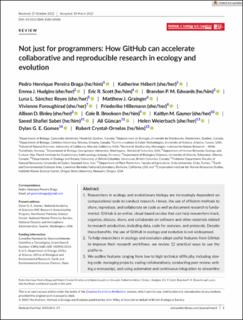Not just for programmers: How GitHub can accelerate collaborative and reproducible research in ecology and evolution
| dc.contributor.author | Braga, Pedro Henrique Pereira | |
| dc.contributor.author | Hébert, Katherine | |
| dc.contributor.author | Hudgins, Emma J. | |
| dc.contributor.author | Scott, Eric R. | |
| dc.contributor.author | Edwards, Brandon P. M. | |
| dc.contributor.author | Reyes, Luna L. Sánchez | |
| dc.contributor.author | Grainger, Matthew | |
| dc.contributor.author | Foroughirad, Vivienne | |
| dc.contributor.author | Hillemann, Friederike | |
| dc.contributor.author | Binley, Allison D. | |
| dc.contributor.author | Brookson, Cole B. | |
| dc.contributor.author | Gaynor, Kaitlyn M. | |
| dc.contributor.author | Sabet, Saeed Shafiei | |
| dc.contributor.author | Güncan, Ali | |
| dc.contributor.author | Weierbach, Helen | |
| dc.contributor.author | Gomes, Dylan G.E. | |
| dc.contributor.author | Crystal-Ornelas, Robert | |
| dc.date.accessioned | 2023-04-25T12:33:55Z | |
| dc.date.available | 2023-04-25T12:33:55Z | |
| dc.date.created | 2023-04-24T12:57:11Z | |
| dc.date.issued | 2023 | |
| dc.identifier.issn | 2041-210X | |
| dc.identifier.uri | https://hdl.handle.net/11250/3064963 | |
| dc.description.abstract | 1. Researchers in ecology and evolutionary biology are increasingly dependent on computational code to conduct research. Hence, the use of efficient methods to share, reproduce, and collaborate on code as well as document research is fundamental. GitHub is an online, cloud-based service that can help researchers track, organize, discuss, share, and collaborate on software and other materials related to research production, including data, code for analyses, and protocols. Despite these benefits, the use of GitHub in ecology and evolution is not widespread. 2. To help researchers in ecology and evolution adopt useful features from GitHub to improve their research workflows, we review 12 practical ways to use the platform. 3. We outline features ranging from low to high technical difficulty, including storing code, managing projects, coding collaboratively, conducting peer review, writing a manuscript, and using automated and continuous integration to streamline analyses. Given that members of a research team may have different technical skills and responsibilities, we describe how the optimal use of GitHub features may vary among members of a research collaboration. 4. As more ecologists and evolutionary biologists establish their workflows using GitHub, the field can continue to push the boundaries of collaborative, transparent, and open research. collaboration, data management, ecoinformatics, GitHub, open science, project management, reproducible research, version control | en_US |
| dc.language.iso | eng | en_US |
| dc.rights | Navngivelse 4.0 Internasjonal | * |
| dc.rights.uri | http://creativecommons.org/licenses/by/4.0/deed.no | * |
| dc.title | Not just for programmers: How GitHub can accelerate collaborative and reproducible research in ecology and evolution | en_US |
| dc.title.alternative | Not just for programmers: How GitHub can accelerate collaborative and reproducible research in ecology and evolution | en_US |
| dc.type | Peer reviewed | en_US |
| dc.type | Journal article | en_US |
| dc.description.version | publishedVersion | en_US |
| dc.rights.holder | © 2023 The Authors | en_US |
| dc.subject.nsi | VDP::Økologi: 488 | en_US |
| dc.subject.nsi | VDP::Ecology: 488 | en_US |
| dc.source.journal | Methods in Ecology and Evolution | en_US |
| dc.identifier.doi | 10.1111/2041-210X.14108 | |
| dc.identifier.cristin | 2142869 | |
| cristin.ispublished | true | |
| cristin.fulltext | original | |
| cristin.qualitycode | 2 |
Tilhørende fil(er)
Denne innførselen finnes i følgende samling(er)
-
Publikasjoner fra CRIStin - NINA [2364]
-
Scientific publications [1392]
Vitenskapelige artikler, kapitler og monografier i Open Access.

